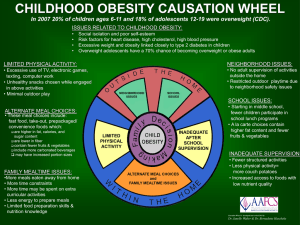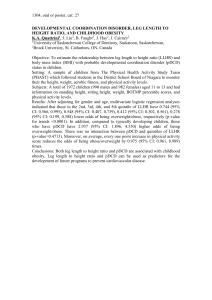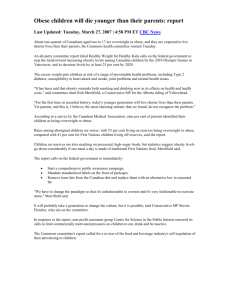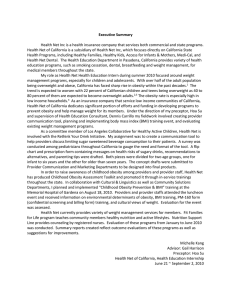Obesity quadruples to nearly one billion in developing world
advertisement
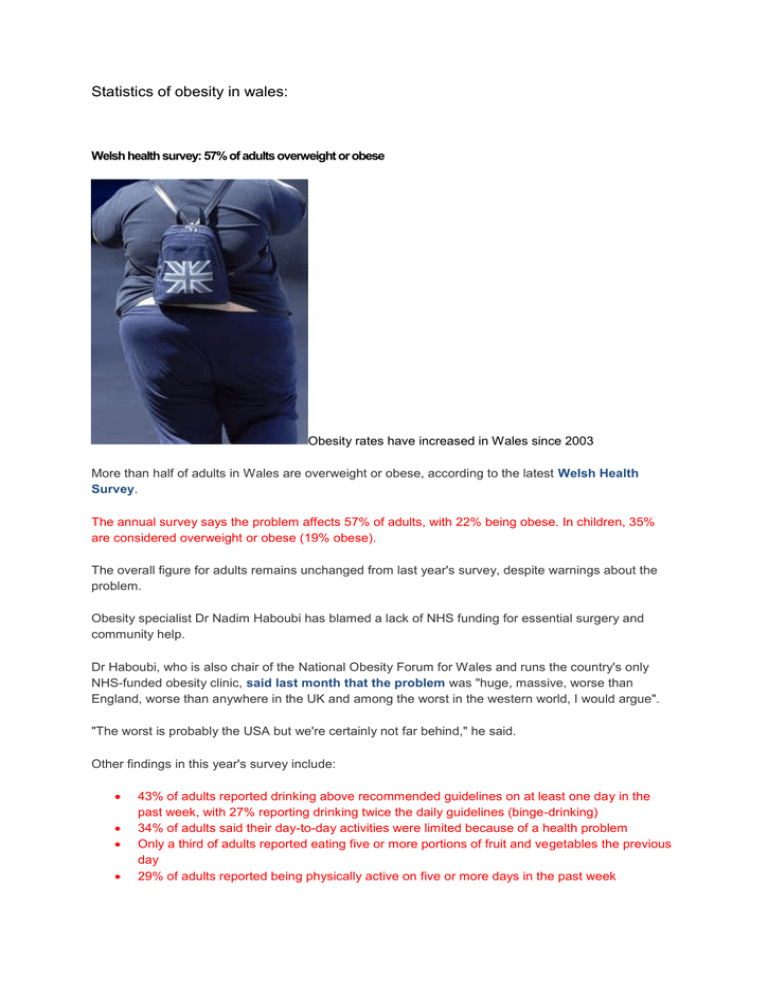
Statistics of obesity in wales: Welsh health survey: 57% of adults overweight or obese Obesity rates have increased in Wales since 2003 More than half of adults in Wales are overweight or obese, according to the latest Welsh Health Survey. The annual survey says the problem affects 57% of adults, with 22% being obese. In children, 35% are considered overweight or obese (19% obese). The overall figure for adults remains unchanged from last year's survey, despite warnings about the problem. Obesity specialist Dr Nadim Haboubi has blamed a lack of NHS funding for essential surgery and community help. Dr Haboubi, who is also chair of the National Obesity Forum for Wales and runs the country's only NHS-funded obesity clinic, said last month that the problem was "huge, massive, worse than England, worse than anywhere in the UK and among the worst in the western world, I would argue". "The worst is probably the USA but we're certainly not far behind," he said. Other findings in this year's survey include: 43% of adults reported drinking above recommended guidelines on at least one day in the past week, with 27% reporting drinking twice the daily guidelines (binge-drinking) 34% of adults said their day-to-day activities were limited because of a health problem Only a third of adults reported eating five or more portions of fruit and vegetables the previous day 29% of adults reported being physically active on five or more days in the past week 16% of adults said their health in general was excellent, 34% very good, 30% good, 15% fair and 6% poor 32% of adults reported attending the outpatient department of a hospital in the last 12 months Another document, Trends in health-related lifestyle in Wales, looks at trends in Welsh health surveys from 2003/4 to 2011. Among other findings, it says: Obesity rates have increased since 2003, although they appear to be rising more slowly since 2007 Smoking rates decreased between 2003/4 and 2011 There has been little change in the overall levels of drinking above guidelines and binge drinking since 2008 Since 2008, there was a slight decrease in the percentage of adults consuming five or more portions of fruit and veg Physical activity levels remained relatively stable between 2003/4 and 2011 Dr Ruth Hussey, Chief Medical Officer for Wales, said: "We have seen a slow down in rising obesity rates in recent years and smoking rates have decreased since 2003/04. "There has been little change in alcohol consumption and physical activity rates over the past few years. "However there is no room for complacency when it comes to encouraging healthier behaviour and there is more to be done." http://wales.gov.uk/statistics-and-research/welsh-health-survey/?lang=en http://www.walesonline.co.uk/news/wales-news/alarm-wales-soaring-obesity-figures-6279443 http://www.assemblywales.org/Research%20Documents/Childhood%20Obesity%20%20Quick%20guide-02072013-229581/qg12-0004-English.pdf Obesity quadruples to nearly one billion in developing world Diets are changing wherever incomes are rising in the developed world The number of overweight and obese adults in the developing world has almost quadrupled to around one billion since 1980, says a report from a UK think tank. The Overseas Development Institute said one in three people worldwide was now overweight and urged governments to do more to influence diets. In the UK, 64% of adults are classed as being overweight or obese. The report predicts a "huge increase" in heart attacks, strokes and diabetes. Globally, the percentage of adults who were overweight or obese - classed as having a body mass index greater than 25 - grew from 23% to 34% between 1980 and 2008. The majority of this increase was seen in the developing world, particularly in countries where incomes were rising, such as Egypt and Mexico. The ODI's Future Diets report says this is due to changing diets and a shift from eating cereals and grains to the consumption of more fats, sugar, oils and animal products. A total of 904 million people in developing countries are now classed as overweight or above, with a BMI of more than 25, up from 250 million in 1980. This compares to 557 million in high-income countries. Over the same period, the global population nearly doubled. At the same time, however, under-nourishment is still recognised to be a problem for hundreds of millions of people in the developing world, particularly children. Using data published in Population Health Metrics last year, the researchers looked at changing overweight and obesity rates across the regions of the world and by individual country. The regions of North Africa, the Middle East and Latin America saw large increases in overweight and obesity rates to a level on a par with Europe, around 58%. While North America still has the highest percentage of overweight adults at 70%, regions such as Australasia and southern Latin America are now not far behind with 63%. Diet linked to income: The greatest growth in overweight people occurred in south east Asia, where the percentage tripled from a lower starting point of 7% to 22%. Among individual countries, the report found that overweight and obesity rates had almost doubled in China and Mexico, and risen by a third in South Africa since 1980. Many countries in the Middle East also had a high percentage of overweight adults. One of the report authors, Steve Wiggins, said there were likely to be multiple reasons for the increases. More meat, fats and sugar are being consumed globally "People with higher incomes have the ability to choose the kind of foods they want. Changes in lifestyle, the increasing availability of processed foods, advertising, media influences... have all led to dietary changes." He said this was particularly the case in emerging economies, where a large middle class of people with rising incomes was living in urban centres and not taking much physical exercise. The result, he says, is "an explosion in overweight and obesity in the past 30 years" which could lead to serious health implications. This is because consumption of fat, salt and sugar, which has increased globally according to the United Nations, is a significant factor in cardiovascular disease, diabetes and some cancers. The world's top sugar consumers include the United States, Belgium, the Netherlands, New Zealand, Costa Rica, and Mexico. To combat the rising tide of obesity, Mr Wiggins recommends more concerted public health measures from governments, similar to those taken to limit smoking in developed countries. He said: "Politicians need to be less shy about trying to influence what food ends up on our plates. "The challenge is to make healthy diets viable whilst reducing the appeal of foods which carry a less certain nutritional value." The report cites the example of South Korea where efforts to preserve the country's traditional diet have included public campaigns and large-scale meal preparation training for women. Alan Dangour, a reader in food and nutritional global health at the London School of Hygiene and Tropical Medicine, said urbanisation in many parts of the world had changed people's eating habits away from traditional, healthy diets. But he said obesity and under-nutrition often existed side by side, sometimes in the same household. "We need to act urgently to deal with the scandal of millions of cases of extreme hunger and under-nutrition in children, but we also need to think what happens if we provide lots of extra calories, containing few vitamins, and encourage excess consumption. Would people in the UK support a tax on fatty foods? "Clever, joined-up policies are needed." A spokesperson from the Department of Health said they recognised that high rates of obesity caused dangerous health conditions and were taking action. "We are already taking the lead in helping tackle and prevent this challenge, including through the government's Responsibility Deal with industry, NHS Health Checks, the National Child Measurement Programme in schools and through Change4Life. "For the first time ever, we've given local authorities ring-fenced budgets to tackle public health issues in their local area, including obesity." The Department of Health also said that industry and health professionals had a role to play in helping people improve their diet and lifestyles.
